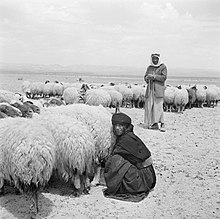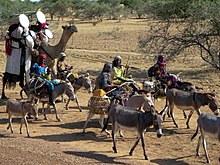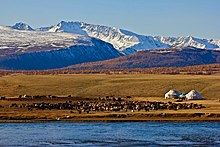Pastoral society
[2] There have been initiatives seeking to promote cross-border trade and also document it, in order to both stimulate regional growth and food security, but also allow the effective vaccination of livestock.
[2] One of the consequences of the break-up of the Soviet Union and the subsequent political independence and economic collapse of its Central Asian republics is the resurgence of pastoral nomadism.
Taking the Kyrgyz people as a representative example, nomadism was the centre of their economy prior to Russian colonization at the turn of the C19/C20, when they were settled into agricultural villages.
The population became increasingly urbanized after World War II, but some people continued to take their herds of horses and cows to the high pasture (jailoo) every summer.
Since the 1990s, as the cash economy shrank, unemployed relatives were absorbed back on the family farm, and the importance of this form of nomadism has increased.







